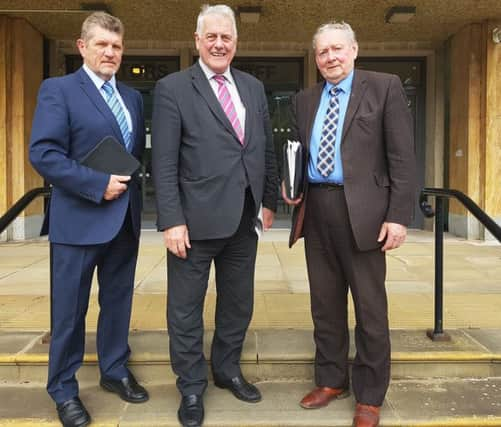Ulster Unionists raise flooding concerns


Ulster Unionist MEP Jim Nicholson led the delegation and was accompanied by party colleagues Councillor Bert Wilson and Alderman Derek Hussey.
Whilst the primary focus of the meeting was the response to the flooding, a range of other issues including Brexit, the second tranche of the FBIS, ammonia emissions and bTB were also on the agenda.
Advertisement
Advertisement
Speaking after the meeting, Mr Nicholson said: “I recently met with some of the households and farm businesses hit by last month’s flash flooding in the Glenelly Valley. The scale of destruction was staggering.
“Given the nature of the damage I felt it was essential that those affected receive assistance as soon as possible from departments and agencies. I was therefore pleased that DAERA’s permanent secretary Noel Lavery and a number of key departmental officials agreed to meet with myself and party colleagues Councillor Bert Wilson and Alderman Derek Hussey.
“The meeting was a very useful opportunity to directly brief Mr Lavery and his team on the needs of those affected by the flood water and to receive an update on the department’s efforts to help farmers.”
Councillor Wilson outlined the extent of damage caused to; fencing, farm buildings, silage ground and crops. The Ulster Unionist councillor also highlighted the wider consequences of the on-going wet weather for farmers and growers more generally.
Advertisement
Advertisement
Alderman Hussey explained to officials how damaged infrastructure is causing problems for everyone living and working in the area and called for effective coordination between departments and agencies to both ensure that roads and bridges are quickly repaired and to provide help to the; homes, businesses, and sports facilities hit by the flooding.
Mr Nicholson continued: “Whilst I welcome DAERA’s commitment to make advance payments to farm businesses I do feel that given the circumstances more assistance is required.
“The costs associated with the clear up are likely to be significant and are over and above the normal costs associated with running a farm business. For example the level of debris on farmland will mean that many of those farms affected will have to re-seed ground next year and there is also a large amount of fencing that needs replaced.
“During the meeting we therefore pressed officials on the need for additional support. We had a frank discussion on possible options, including for example a scheme through Pillar II (RDP), which has not been totally ruled out by the department, or alternatively one drawing on extra funds as has been rolled out for farmers in Donegal. It is however clear that either option would require Ministerial approval.
Advertisement
Advertisement
“This is therefore just the latest example of how the lack of a functioning NI Executive means that key decisions, across a range of policy areas, are not being taken. The on-going political vacuum at Stormont continues to have real implications for Northern Ireland’s households, communities and businesses.”